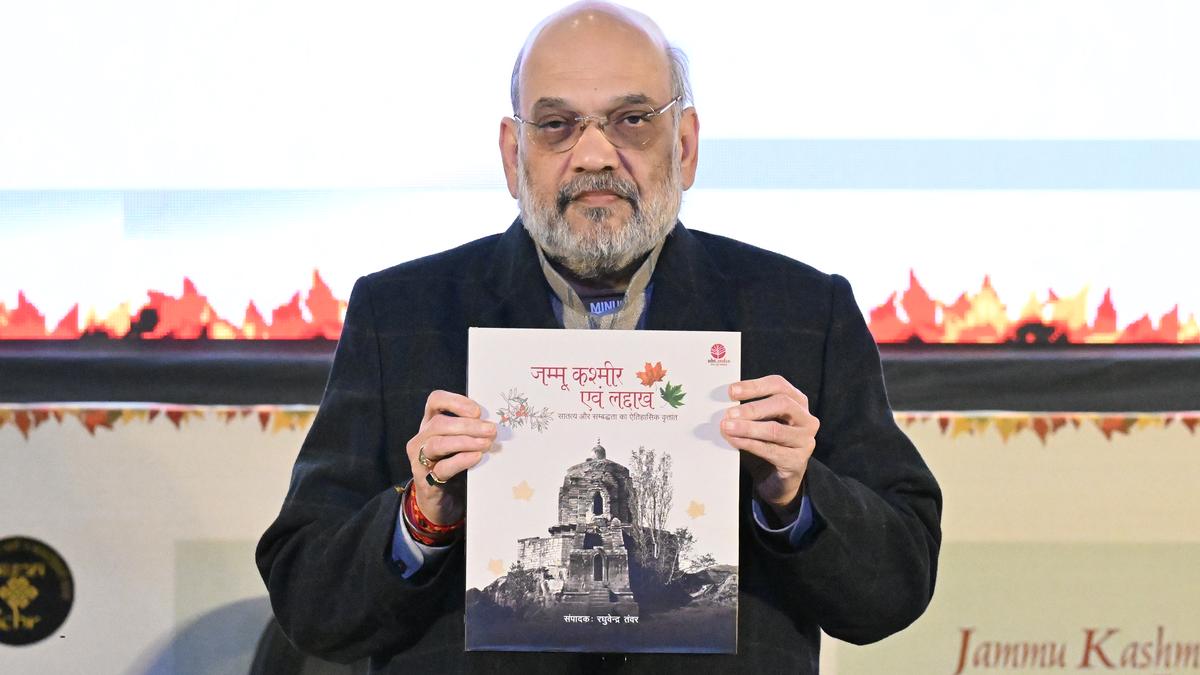
Article 370 caused spread of terrorism in Kashmir: Amit Shah
The Hindu
Union Home Minister Amit Shah highlights the impact of Article 370 on Kashmir's youth, terrorism, and historical narratives in new book.
Article 370 was responsible for sowing the seeds of separatism among the youth in Kashmir by giving credence to the idea that Kashmir’s relationship with India was temporary, Union Home Minister Amit Shah said on Thursday (January 2, 2024). He pointed out that while there are other Muslim majority areas in the country, terrorism has not spread to those regions.
“I am often asked what is Article 370’s relation with terrorism. It sowed the seeds of separatism among youth in Kashmir,” Mr. Shah said, speaking at a book launch. “Why did terrorism not spread in other Muslim areas of the country? There is an argument that Kashmir shares a border with Pakistan. Even Gujarat and Rajasthan share borders with Pakistan, but terrorism did not reach there. Article 370 promoted the misconception that the relationship between India and Kashmir is temporary. Gradually, separatism transformed into terrorism. It is unfortunate that 40,000 people lost their lives,” Mr. Shah said.
He said that development took a backseat for decades, while there was “a naked dance of terrorism” in the former State of Jammu and Kashmir.
The special status of J&K under Article 370 of the Constitution was revoked by the Parliament on August 5, 2019.
Mr. Shah was speaking at an event to release J&K and Ladakh :Through The Ages, a collaborative effort of the National Book Trust and the Indian Council of Historical Research (ICHR). The book is an honest work to trace the 8,000 year-old history of Kashmir, the Home Minister said, claiming that Kashmir may have been named after the sage Rishi Kashyap.
“A myth was floated that the country was never one, many people believed this. When we go to the roots of this, the history written under the British, due to their lack of knowledge, their description of the country was erroneous. We are a geo-cultural country, whose boundaries are defined by culture. From Gandharva [in Afghanistan] to Odisha, those who look at a country as a geo-political entity can never define this country. Till the time the historians prove this theory with evidence, the world cannot understand our history,” Mr. Shah said.
The book aims to document the story of Jammu, Kashmir, and Ladakh with a perspective and format that enables an overview for both the subject specialist and those less conversant with the region’s history, he said.

Nine months into the ‘Shishtachar’ (discipline/etiquette) drive, Delhi Police officers say the squads have offered more than an on-ground deterrence against harassment of women in public spaces. The steady presence of these teams on the streets, the officers claim, has revealed patterns of everyday misconduct, helped map pockets where offenders gather, enhanced visibility among women, and strengthened the feedback loop, which in turn has improved policing of such offences. Deputy Commissioner of Police (Outer Delhi) Sachin Sharma said the squads have detained 2,885 offenders over the past nine months and recorded a 45% decline in crimes against women, including cases of rape, molestation and harassment. “Overall, such cases have fallen sharply from 302 in 2024 to 165 in 2025 (till December 10),” he said. DCP (West) Darade Sharad Bhaskar reported similar numbers. “In nine months, we have detained over 2,500 offenders under various sections. The help and perspective we have received through the initiative has improved our approach. We have decided to introduce these squads to each police station in our district,” he said.












